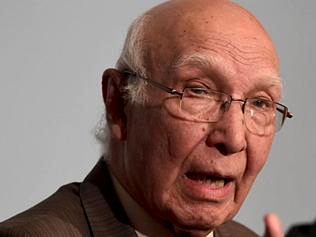Islamabad, Dec 27: Prime Minister Nawaz Sharif's Adviser on Foreign Affairs Sartaj Aziz today said it would not be fair to expect much from the talks scheduled here next month between the foreign secretaries of Pakistan and India.

"And therefore, initially focus would be on reduction of tension and maintenance of calm on the Line of Control to provide relief to the people living across LoC," he said.
Aziz said the comprehensive dialogue in January between Pakistan and India will focus on all outstanding issues, including Kashmir.
He said in a meeting between prime ministers of India and Pakistan in Lahore yesterday it was decided that foreign secretaries of the two countries would meet in mid-January to decide details of dialogue on all issues.
To a question, he said promotion of good relations with all neighbours is the policy of Prime Minister Sharif as this is a pre-requisite to benefit from projects aimed at regional connectivity and resolution of energy crisis.
Injecting an element of drama into the see-saw Indo-Pak ties, Prime Minister Narendra Modi yesterday took the world by surprise by making a "stopover" in Lahore on his way back home from Kabul to greet Sharif on his 66th birthday.
The first visit by an Indian premier in 11 years marked another step forward by the two countries in their efforts to put on an even keel in their ties which was going through a chill until recently.
Modi also attended a marriage function of Sharif's grand-daughter Mehrun Nisa (who is the daughter of Mariam Nawaz Sharif) at the latter's Raiwind home on the outskirts of Lahore.
Information Minister Pervaiz Rashid, meanwhile, said that Pakistan wants to resolve the Kashmir issue peacefully.
Addressing a round-table interaction on Kashmir in the capital Islamabad, he, however, said that Pakistan would continue to support the Kashmir cause but wants a peaceful solution to the issue.
He said that any international issue cannot be resolved with static approach and new ways must be explored to resolve the disputes, Radio Pakistan reported.
Rashid said war is no solution to any dispute which could be resolved through talks.





Comments
Add new comment